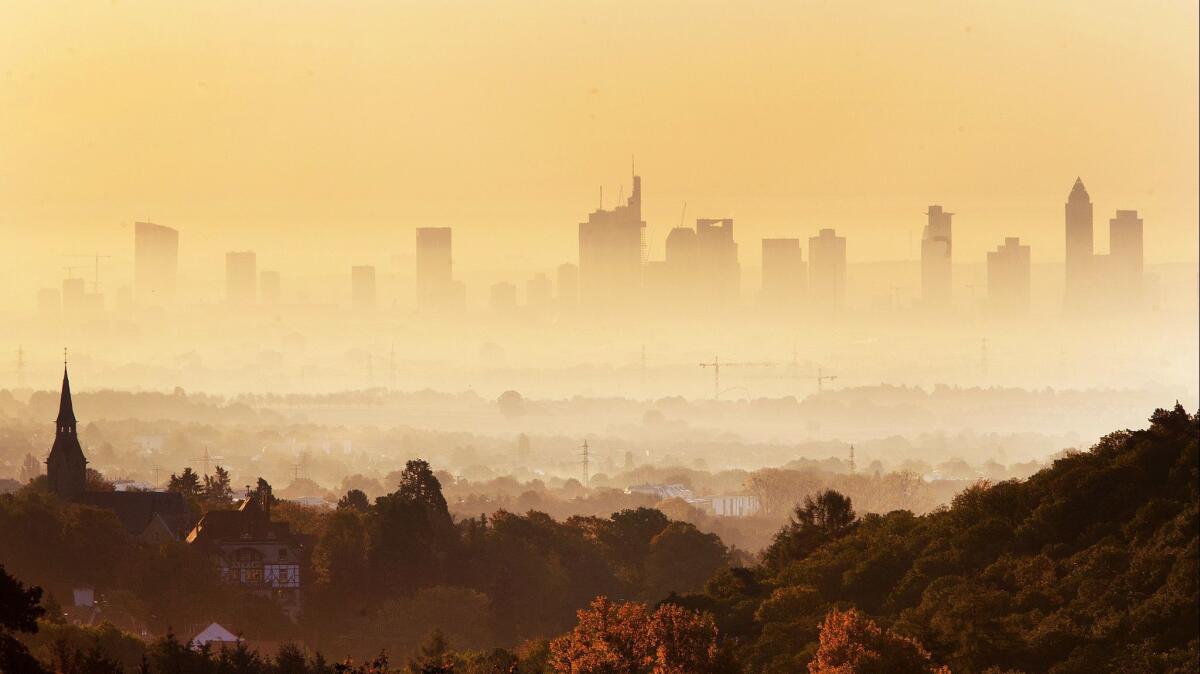Op-Ed: There’s a rational, evidence-based argument for optimism for humankind. Really

- Share via
Anxious about the state of the country? You’re not alone. Seven in 10 Americans across all age groups report negative feelings when asked about what’s happening today in the United States. Democrats are somewhat more pessimistic than Republicans.
But what if there were a rational, evidence-based argument for optimism? There is. But we have to step back from two- and four-year election cycles to see it. Much farther back.
I’ve been thinking about our hope for the future for about 40 years, starting when I co-wrote a book called “A New Reality” with my father, polio vaccine inventor Dr. Jonas Salk. Back in 1981, we used scientific data to show that humans were fast approaching the point where global population growth would peak and then slow down. We built a case that after this inflection point, human societies increasingly would value cooperation, conservation, long-range thinking and interdependence. At the same time, the tenets related to rapidly accelerating population growth — competition, unbridled exploitation of resources, short-range thinking and independence — would recede.
In this era, values of cooperation, interdependence and sustainability will emerge.
That inflection point has arrived. After millennia of acceleration, population growth is finally slowing. Worldwide improvements in health, sustainable development and the education of women have led people to have fewer children. If current U.N. projections bear out, the global population will plateau around the end of this century, then likely begin to decline.
This remarkable change divides human existence into two phases. In the first, natural resources — as well as advances in industry and technology — seemed limitless. Humanity was expanding exponentially, and the population groups that grew the fastest, competed most effectively and exploited others were the most successful. History clearly demonstrates the societal values of this era: competitiveness, independence, unfettered consumption.
The second phase, our future, is an era of slowing, when we’ve accepted the presence of limits on growth and consumption. In this period, we will be increasingly dependent on one another for survival. Collaboration becomes the most effective strategy for using resources, but also for avoiding competition that could lead to catastrophic famine or war. Promoting worldwide health helps us all by stabilizing social conditions. In this era, values of cooperation, interdependence and sustainability will emerge. Success will mean bridging divides and taking approaches that benefit all rather than the few.
To be sure, long-range prediction is hardly an exact science — and others insist we are headed for the collapse of civilization. So what makes this optimistic prediction about our values scientific rather than just idealistic? It reflects how humans are likely to adapt to the predictable conditions of the near and distant future. Increasing population puts pressure on us to improve quality of life in all regions. Infinite growth is impossible. So we will respond, as other human societies have done, by balancing our relationship with nature and with each other.
The likelihood of this change is hard to discern from our current vantage point: We’re right in the middle of the contentious transition between the two value systems. Clashes and conflicts are inevitable, and we see them playing out on an individual, national and global level: sustainability vs. consumption, interdependence vs. isolationism, promoting the well-being of all vs. looking out for ourselves. It’s overwhelming and we can hardly imagine where it will end. Will civilization survive? Will humanity? Will the planet?
It is terrifying to contemplate. In the absence of a coherent narrative for the future, many are futilely turning to the values of the past, hoping that doing so can exempt us from facing what’s coming. It can’t.
Enter the Fray: First takes on the news of the minute from L.A. Times Opinion »
Opening up our minds to what we do know will help us meet the future more successfully. We know the change in direction of the population curve. We know that will inevitably alter economic, environmental and demographic realities. From there, we can deduce what changes will promote a future in which we survive by adjusting to planetary limits.
Navigating the transition requires arduous, even heroic work at all levels of society — changing policies, values and behavior with respect to climate change, sustainable development, health, education (especially for women), and distribution of wealth and resources, while resisting the allure of clinging to the values of the past. This may be idealistic, but it is far from impossible.
This optimistic scenario is as evidence-based as today’s widespread fear or pessimism. Humankind has demonstrated the ability to solve seemingly unsolvable problems. We can do so again. If we can broaden our outlook beyond the next few months or years, there are rational reasons to be hopeful about our future.
Dr. Jonathan Salk is a practicing psychiatrist and teaches at the UCLA David Geffen School of Medicine. “A New Reality,” the book he co-authored with his father Dr. Jonas Salk, has been newly updated and republished.
Follow the Opinion section on Twitter @latimesopinionand Facebook.
More to Read
A cure for the common opinion
Get thought-provoking perspectives with our weekly newsletter.
You may occasionally receive promotional content from the Los Angeles Times.










